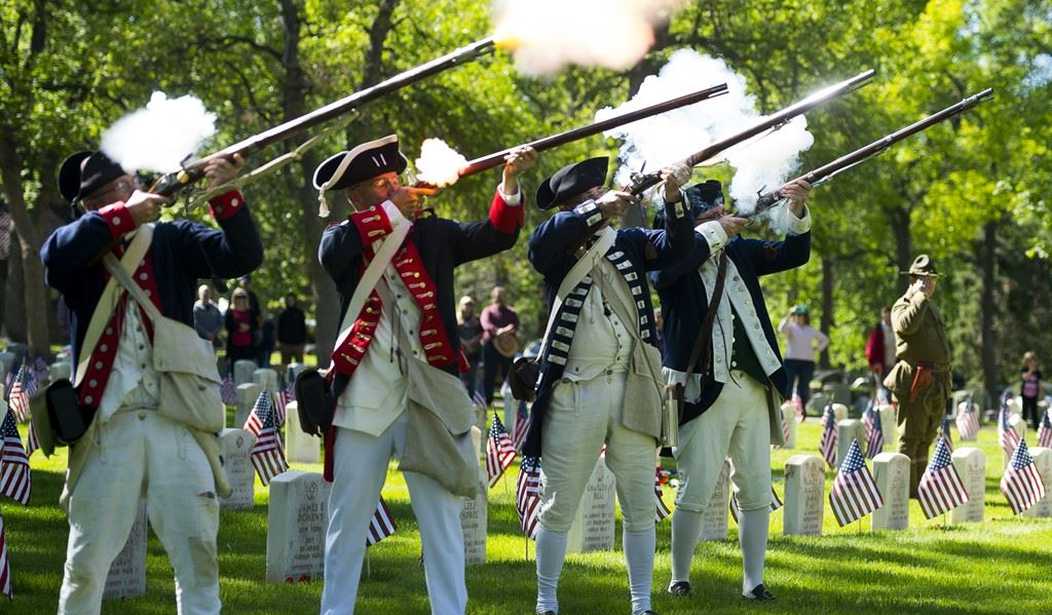The official birthday of the USA is July 4, 1776, the day on which the Declaration of Independence was issued. But months before independence became official, an Irish immigrant and Patriot Revolutionary who was one of George Washington’s most trusted officers called our nation by its name for the first time on record.
On Jan. 2, 1776, Stephen Moylan wrote a letter to Washington’s secretary Joseph Reed discussing the qualifications of the soldiers and sailors under his command and his difficulties in obtaining supplies. Only a few days before, Moylan’s communication had referred to the “United Colonies.” Either he alone or he and his fellow officers and Washington thought that it was time to stop referring to the Americans as colonists, because with the new year he used a new name: “United States of America.”
Moylan, like his fellow officer John Fitzgerald (Washington’s “favorite” aide from the Revolution), was not born in the country he is now credited with naming. There is all too little known about Moylan, despite his undoubted historical importance; in fact, I have not been able to find a single contemporaneous portrait of him.
So what do we know? Moylan was an Irish Catholic immigrant to America, a merchant who early in the war joined George Washington’s “secret” Navy. At the time, Washington did not have authority from Congress to create a navy, but the need was more pressing than the bureaucratic process would allow, and Washington so firmly believed a Navy was essential to the Americans’ war effort that he began outfitting one in late 1775.
Historian Patrick K. O’Donnell describes Moylan while discussing Washington’s Navy in "The Indispensables":
As the enterprise expanded, Washington brought in the army’s muster-master general, Stephen Moylan, to assist [John] Glover in managing the burgeoning navy. The muster-master general had the arduous task of accounting for the men in each of the Continental Army’s units. A tough, husky Irish immigrant, Moylan hailed from a prominent Irish trading family who sent him to Paris and later Lisbon for his education. The well-spoken gentleman with a brogue had a keen mind for international trade and business. Elected before the war as the first president of the Friendly Sons of St. Patrick, an organization of prosperous merchants, Moylan is credited with coining the term ‘the United States of America’ in a January 2, 1776, missive to Joseph Reed, Washington’s secretary and aide-de-camp.
On this day in 1776, Stephen Moylan is the first person on record to use the term ‘United States of America’.
— Catherine Salgado (@CatSalgado32) January 2, 2025
Below is my drawing of Moylan pic.twitter.com/g9EKS8xRIS
As I noted above, we don’t know for certain if the name was entirely Moylan’s original invention or whether he and Washington or he and his fellow officers coined it jointly. What is key is that Moylan’s Jan. 2 letter seems to be the earliest recorded use of the name “United States of America.” And Moylan served those United States well, both in the Revolution that ensured their independence and afterward as well: “Moylan remained close to George Washington, was appointed Commissioner of Loans in Philadelphia in 1793, and is the namesake of Moylan, an unincorporated community in southeast Pennsylvania.”
Related: Washington Crossing the Delaware and American Ideals in One Painting
In his historic 1776 letter, Moylan wrote to Reed about the “full and ample powers from the United States of America”. A New Year always inspires people with a desire for grander achievements and new beginnings, and that New Year’s Day was the first instance of the raising of the “Grand Union” flag, America’s first official flag. At the same time, an insulting and threatening speech from King George III of England to Parliament had arrived in the American colonies to enrage freedom-loving patriots and made it crystal clear that those who hoped for a diplomatic resolution of England’s tyrannical actions against America were fooling themselves. Perhaps Moylan felt that with a new flag and a new aspect to the conflict, it was time for a new nation with a brand-new name.
Indeed, Moylan referred to George III’s letter in his own missive, “Look at the King’s speech – it is enclosed in this, or in the General’s letter to you … – will they [Congress] not declare what his Most Gracious Majesty insists on they have already done?” King George said the Americans wanted to be independent, did he? Well, perhaps that was not such a bad idea. Indeed, perhaps it was the only option for those who loved liberty. The “General’s letter” (Washington’s) had reportedly also indicated this would be the new direction taken by the Americans. Moylan was already enthusiastically ready for it.
Thus, sometime between Christmas Day 1775 and Jan. 2, 1776, Moylan had ceased to think of the land and people he had adopted and fought for as “United Colonies” and begun to think of them as “United States.” The term “state” inherently carries with it implications of national sovereignty. Moylan evidently understood the term thus, because he mentions the “United States” in the context of wishing said United States to treat with Spain, a foreign nation.
This would be the action of an independent entity, not merely that of a band of rebels within a larger empire. The Revolutionary Army was not a discontented rabble of American colonists trying to win concessions from their ruler. They were now hoping to be citizens fighting a foreign tyrant for their own nation and their independence.
[NYHistory.org] Here, on January 2, 1776, seven months before the Declaration of Independence and a week before the publication of [Thomas] Paine’s Common Sense, Stephen Moylan, an acting secretary to General George Washington, spells it out, ‘I should like vastly to go with full and ample powers from the United States of America to Spain’ to seek foreign assistance for the cause.
As I said, Moylan wrote his letter to Col. Joseph Reed, aide-de-camp to Gen. Washington, who at the time was in Philadelphia on leave. Moylan was at the Continental Army’s Cambridge, Mass., headquarters.
The Irish Catholic Moylan did have appropriate European contacts for his proposed Spanish mission since he had established himself in Lisbon as a merchant before settling in 1768 in Philadelphia. . .Moylan served in various capacities during the revolution, including quartermaster-general and cavalry colonel, but not without the vicissitudes—forced resignations, limited supplies, courts-martial—of a Continental officer in the protracted struggle. In a slim 1909 biography, he is depicted as a true hothead for independence (quite unlike his counterpart Joseph Reed). . .
Byron DeLear follows up on his discovery [of the letter] with the speculation that Moylan and Reed, as secretaries, would not likely be throwing around the term ‘United States of America’ without the approval of their boss, Commander-in-Chief George Washington.”
This is speculation, of course, and we may never know for certain why Moylan used the term. As I said above, however, the most important thing is that Moylan first said, or rather wrote, “United States of America.” As a soldier, officer, merchant, immigrant, patriot, and public servant, Stephen Moylan played an important role in helping Washington during the Revolution and he must be credited with titling this great nation of ours the “United States of America.”
Names have power. They shape the identities of individuals and nations, which is why woke Marxists are always renaming people and places and ideas to change how we think. America can only thrive and prosper so long as it is united and sees itself as a unique nation, sovereign, free, historically original, not a mere member of a global cohort. This year, a new president is coming into office, and we have the chance to ensure that America is again strengthened and flourishing, free and great. It is the perfect time to rediscover the forgotten American hero, Stephen Moylan.










Join the conversation as a VIP Member